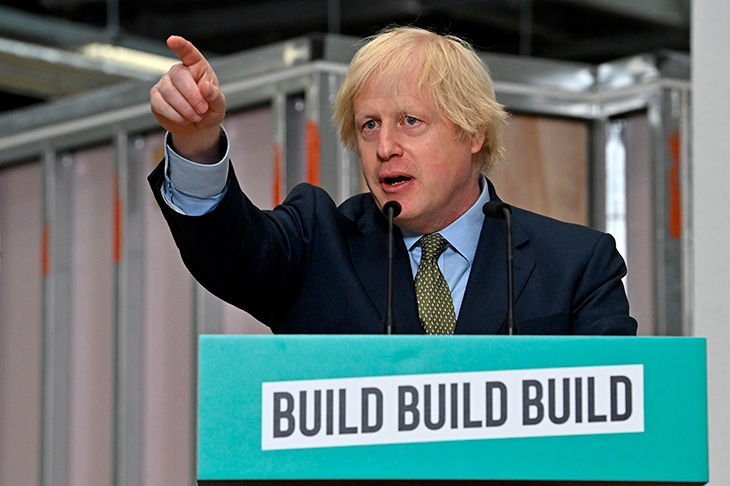John Maynard Keynes looks down and smiles, recalling his own perhaps too-often quoted remark that ‘when the facts change, I change my mind’. Boris Johnson’s £5 billion ‘New Deal’ of school and hospital projects to stimulate the pandemic-torn economy is pure Keynes, as well as a conscious reference to Franklin Roosevelt. And like the totality of the Treasury response to Covid, it represents a 180-degree change of mind from the modern Conservative belief in squashing state spending while letting the private sector drive.
But in dire circumstances, most commentators accept it’s right to park ideology and try anything that looks like it might work. And for a while — I’d put it at three weeks, from 23 March to 12 April — it really did feel as if the populace yearned for a bigger, stronger state that was capable of paying all our wages, building hospitals in a fortnight and ordering us how to conduct our lives. In that same phase, capitalism all but closed down, apparently helpless against the scale of the catastrophe. A new era of socialist dirigisme loomed.
Then on that April day, the Prime Minister came out of hospital and the Health Secretary announced the tracing app that never was. Ever since, we’ve seen nothing from Downing Street but incompetence and dither, fuelling borderline public disorder. Meanwhile businesses large and small began to find their feet again, pivoted their plans, adapted their processes and found ways in every sector from bioscience to catering to contribute to the national struggle.
Some, for sure, will go under — and some may survive only with the state as a shareholder. But most will pull through, create jobs again and drive a return to prosperity, while Johnson’s New Deal languishes and overruns like Crossrail and is eventually forgotten. Far from collapsing, capitalism and entrepreneurs are quietly having a good crisis: I think wise old Maynard Keynes would agree that we should keep faith with them and shun the temporary resurgence of an over-mighty state.
The danger of QE
Sir Paul Tucker, the former Bank of England deputy governor who’s now at Harvard, thinks the Bank’s quantitative easing programme — £300 billion so far during the crisis — looks dangerously like ‘monetary financing’. That’s the sin, much committed in Zimbabwe, of printing money to pay for government spending.
‘The question is whether the Bank… has now reverted to being the operational arm of the Treasury,’ he told the Royal Economic Society. His former underling Andrew Bailey, now governor, has defended the first £200 billion QE injection in March on the grounds that ‘we basically had a pretty near meltdown of some of the core financial markets’ and if the Bank had not acted as it did, ‘the government would have struggled to fund itself in the short run’.
There’s a certain edge in the juxtaposition of these two men’s career paths, given that Tucker was seen as a shoo-in for governor until the fates conspired to derail him. But they seem to be saying much the same thing — while reaching different conclusions. One of the mysteries of the past decade has been how so much new money could be created through QE around the world without stoking inflation and undermining central bank credibility. As Johnson and Rishi Sunak pile spending promise upon promise, we may be about to find out how that mystery unravels.
Germany’s shame
Wirecard, the Bavarian electronic payments business which last week admitted that €2 billion shown in its accounts and supposedly held in banks in the Philippines probably does not exist, has been described as Germany’s Enron. Its insolvency is a colossal embarrassment for BaFin, Germany’s financial regulator, whose chief Felix Hufeld was right to admit that the episode is ‘shaming’. And it puts another dent in the shield of German probity already damaged by the Volkswagen emissions scandal and troubles at Deutsche Bank. But it’s also a vindication for the piratical short-sellers who have been betting Wirecard’s shares would plunge (as they now have, from €140 to €6) ever since the Financial Times first reported suspicions about the company as far back as 2015.
It’s true to say that the breed of investors and back-bedroom investigators who relish this kind of skirmish also like to cultivate scary reputations: one such is Matthew Earl of ShadowFall Capital, known online as the Dark Destroyer. But BaFin’s response was to investigate the short-sellers and the FT itself for market manipulation, and ban further short-selling, rather than acknowledge the possibility of anything fishy at Wirecard — a national fintech champion once worth €24 billion and a member of the Dax30 index of top stocks.
As the German financial establishment closed ranks, a source tells me there was even ‘a perceived threat of physical violence’ against Wirecard’s detractors. There has been collateral damage in the form of a temporary freeze on UK payment cards that used Wirecard systems, and no doubt there will be ramifications elsewhere. But the rest of the financial world can be forgiven for a frisson of schadenfreude.
Risotto kept us sane
Here’s an example of what I mean about entrepreneurs showing us the way out of the crisis — and it comes, as regular readers would expect, from the restaurant sector. A reader praises Mauro Sanna, owner of four Sardinian restaurants (Olivomare, Olivocarne, Oliveto and Olivo) and an ice cream parlour in Belgravia. ‘After about a week of lockdown, Mauro merged all his kitchens and began offering food for delivery as well as ice cream to go from the gelateria. He also sent some of his delicious thin-crust pizzas nightly to local hospitals. We won’t forget how his seafood risottos have kept us sane — and we’ll repay his courage and generosity with a visit as soon as he reopens.’







Comments